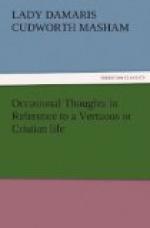But it being sufficiently obvious that want of Instruction concerning Religion does in a Sceptical Age dispose Men to Scepticism and Infidelity, which often terminates in downright Atheism; let us see whether, or no, Ill, by which I mean, all irrational Instruction in regard of Religion, has not the same Tendency.
It is as undeniable as the difference between Men’s being in, and out of their Wits, that Reason ought to be to Rational Creatures the Guide of their Belief: That is to say, That their Assent to any thing, ought to be govern’d by that proof of its Truth, whereof Reason is the Judge; be it either Argument, or Authority, for in both Cases Reason must determine our Assent according to the validity of the Ground it finds it Built on: By Reason being here understood that Faculty in us which discovers, by the intervention of intermediate Ideas, what Connection Those in the Proposition have one with another: Whether certain; probable; or none at all; according whereunto, we ought to regulate our Assent. If we do not so, we degrade our selves from being Rational Creatures; and deprive our selves of the only Guide God has given us for our Conduct in our Actions and Opinions.
Authority yet is not hereby so subjected to Reason, as that a Proposition which we see not the Truth of, may not nevertheless be Rationally assented to by us.
For tho’ Reason cannot from the Evidence of the thing it self induce our assent to any Proposition, where we cannot perceive the Connexion of the Ideas therein contain’d; yet if it appears that such a Proposition was truly reveal’d by God, nothing can be more Rational than to believe it: since we know that God can neither Deceive, nor be Deceived: That there are Truths above our Conception, and that God may (if he so pleases) communicate these to us by Supernatural Revelation.
The part of Reason then, in regard of such a Proposition as this, is, only to examine whether it be indeed a Divine Revelation: which should Reason not attest to the Truth of; it is then evidently Irrational to give, or require assent to it as being so.
And as plainly Irrational must it be to give, or require assent to any thing as a Divine Revelation, which is evidently contrary to Reason; no less being herein imply’d than that God has made us so as to see clearly that to be a Truth, which is yet a Falshood; the which, were it so, would make the Testimony of our Reason useless to us; and thereby destroy also the Credit of all Revelation; for no stronger proof can be had of the Truth of any Revelation than the Evidence of our Reason that it is a Revelation.




